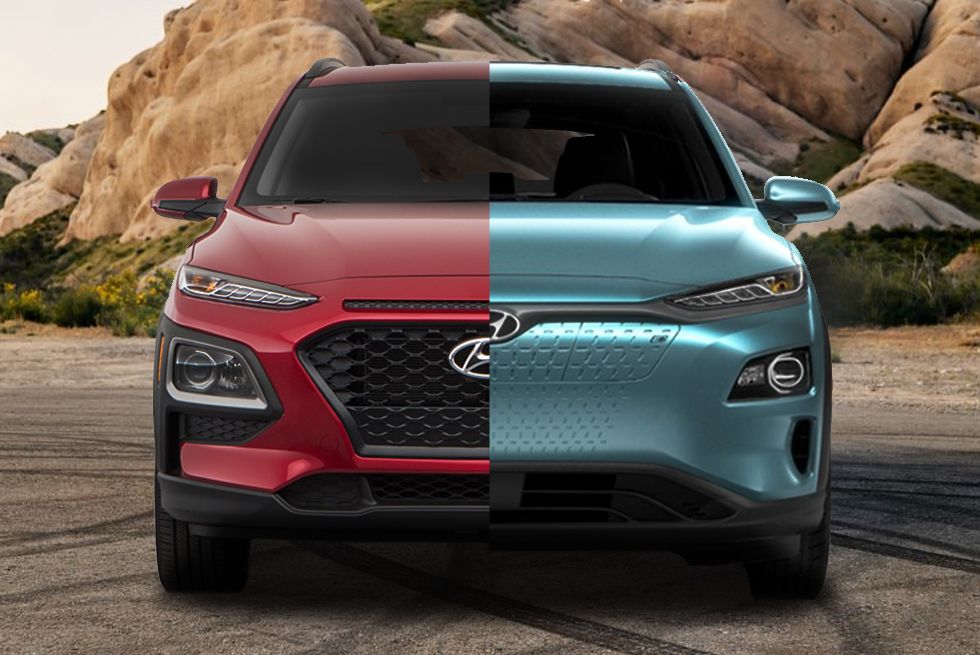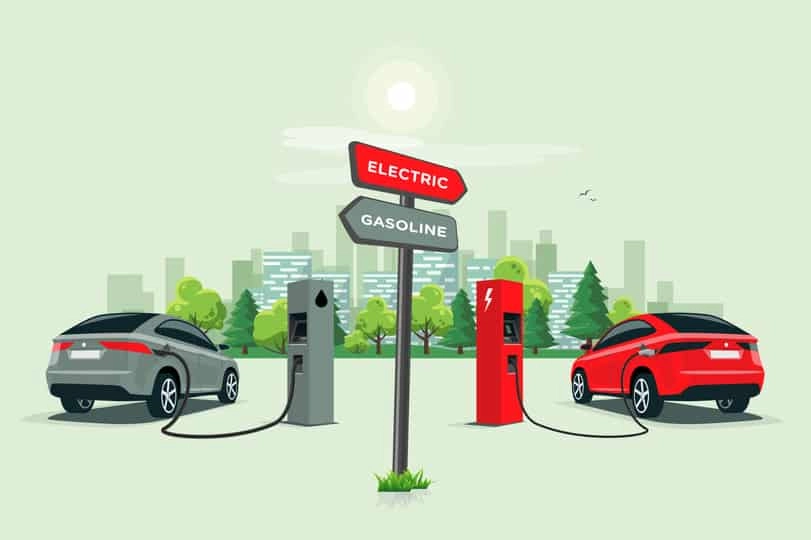Do Electric Cars Last Longer Than Gas Cars?
By Slyng Team
Updated Feb 18, 2024

Many say that electric cars are the future of the automotive industry. After the release of Tesla model cars, EVs started creating a buzz – we’ve seen meteoric increases in the number of electric vehicles on the road. However, although electric cars are gaining popularity, electric motors are constantly compared – and often unfavorably – to gas-powered cars.
Table of Contents
Read the complete article and learn more about how electric cars work, which last longer between electric vehicles and gasoline cars, and their differences.
Electric Cars Vs Gas Cars: What’s The Difference
As the automotive industry improves car-making, electric cars are now on par or are even more powerful than existing gasoline engine cars. As a result, they have major differences that can make or break your decision.
Power Source
Electric cars get their power source through electricity. One downside of this is that it will take hours to recharge. On the other hand, gasoline-powered cars use fuel as their power source – unlike electric vehicles that can take hours to charge, gas cars only take a few minutes to refuel.
Mechanism
An electric vehicle uses a motor to make the car move. Meanwhile, a gas car uses fuel-powered engines to create movement.
Moving Parts
An electric car has only one moving part: the motor. How it works is that the electric power will pass through the battery, transfer to the inverter, and pass on to the motor to generate power. Because it has fewer moving parts, an electric vehicle requires fewer maintenance visits. Therefore, it is often considered more reliable than a gasoline-power car.
On the other hand, a gas car has hundreds of moving parts just to heat the fuel and produce power in the engine. Having more moving parts in the vehicle also requires more maintenance, such as frequent oil changes, filter changes, tune-ups, and the like.
Factors To Consider In An Electric and Gas Cars
Any vehicle has its own advantages and disadvantages; the same goes when comparing an electronic car to a gasoline car. Here is a quick rundown of factors to consider when deciding which type of vehicle is a good fit for your new car.
Maintenance
- EV: With an EV, you do not need to worry about timing belts, oil changes, or transmission issues. Because an EV is composed of only a big motor and EV batteries, you can worry less about maintenance.
- Gasoline car: Gas car maintenance can be quite tedious. Oil changes are required every 20,000 miles, along with other necessary maintenance.
Spare Parts
- EV: Getting a spare part replacement is almost impossible with an electric vehicle. Because of the new battery technology, only a few supplies are readily available for the market. If they are available, the markups of the spare parts are insanely high. We advise going to certified shops when it comes to repairs and part replacements because of the technicalities of the electrical wirings in the car.
- Gasoline car: Since gasoline or diesel vehicles have been around much longer, spare parts are abundant. Many car owners do repairs themselves to save on expenses.
Single Full Tank
- EV: On average, a single charge can last 250 miles. The record holder for EV, done by the 2021 Tesla Model S Performance all-wheel drive with 19-inch wheels, is 387 miles on a single charge.
- Gasoline car: On average, a single full tank of 12 gallons of gas can go for around 300 miles. The record holder for a gas-powered car, done by the 2020 Ram 1500 with an upgraded 33-gallon tank, clocked in 1,056 miles on a single full tank.
Fragility
- EV: EVs may cost more when they experience a crash because you have to replace electronics within the vehicle. It has many fragile and small electrical components inside the car, requiring more than just mechanical repairs and bodywork.
- Gasoline car: Although gas-powered vehicles have electronics under the hood, they do not cost as much as a standard EV. This means that it’s more affordable to replace parts when gasoline vehicles get into a crash.
Idling
- EV: An electric car can last longer, even if not used for a long time, as long as your vehicle is plugged in.
- Gasoline car: A gas-powered car might need a fuel stabilizer. If a car engine does not run for a long time, there could be some damage to your car's engine.

What Affects The Life Expectancy Of Electric Cars?
If you decide to switch from conventional vehicles to electric cars, durability and longevity might be major considerations for you. To extend the lifespan of your electric motor, just take into consideration these key components:
Motor
You do not need to worry about a faulty engine because EVs use a motor, not engines. In addition, electric motors are easier to manage as you only need coolant changes every 100,000 miles. EVs are also proven to last as long as conventional vehicles.
Transmission
Most electric vehicles do not have a transmission, just a single gear reduction. Because of this, you do not have to worry about transmission lifespan when getting an EV for a new car.
Battery
EV battery packs are made of lithium-ion, which can be pretty expensive but last for a really long time. The typical electric car battery pack can last about 200,000 miles or around 20 years. According to car experts, there is even a rumor that Tesla is developing an EV battery that can last 1,000,000 miles.
Alongside this, major EV makers said that there has been only a few battery replacements in the last decade. Fewer battery replacements signify that most EV makers have decent and durable batteries.
Brakes
An electric car uses regenerative braking to slow down the vehicle, which means the hydraulic brake system is not getting used as much. This results in a longer lifespan for the brakes, which can last for over 100,000 miles.

How To Make Electric Cars Last Longer
There are a few things to consider to ensure that you can get the best out of your new electric vehicle. As the battery is one of the main concerns when considering an electric car, here are a few things to be mindful of to make your battery lifespan last longer.
No To Excessive Charging
Electric vehicles should not be overcharged as your car's battery will be exposed to high-voltage, high-amperage electricity. Just like with any gadget or electronics that require electricity to function, this can taint your battery resulting in a depletion of battery life.
Charge When Battery Is Low Level
To make your battery life longer, make sure to charge only when it is at a low level. Never overcharge and, as much as possible, never drain your electric car batteries.
Battery Level Between 40 And 70
The best charging habit is to keep your car battery between 40% and 70%. This means you charge your vehicle when the battery hits 40% and stop charging at 70%. By doing so, you can get the optimal performance range from an EV battery.
Conclusion
Do electric cars last longer than gas cars? When choosing between a conventional vehicle or an electric car, the answer may vary depending on the driver’s preferences. Both EVs and gasoline-powered vehicles have spectacular benefits. On the one hand, readily available spare parts are a major advantage of a gasoline-powered car. On the other hand, maintenance is much more cost-efficient with an electric vehicle.
In addition, your vehicle’s lifespan depends on how you care for it. For example, never overcharge electric vehicles – this ensures that the battery stays in optimal condition for longer.
Frequently Asked Questions
Many people have questions that concern the longevity of engines and motors. Here are some frequently asked questions regarding electric and gasoline vehicles.
Do electric cars last longer?
Compared to a gas car, an electric car can last longer and require less maintenance. However, this is not true in all cases, as parts aren’t always readily available for replacement.
How long do electric car motors last?
Consumer Reports estimates that an average EV's lifespan is around 200,000 miles, which can equate to 17 years of usage if driven 12,000 miles per year.
How long do gas car engines last?
For gasoline engines, the average lifespan of cars lasts for eight years or 150,000 miles. But as technology improves, new designs have increased the average life expectancy to about 10 years or 200,000 miles.
